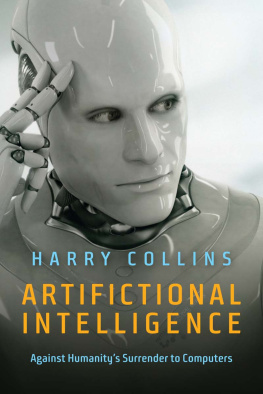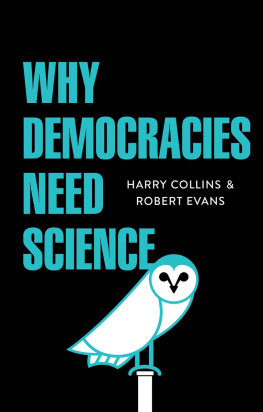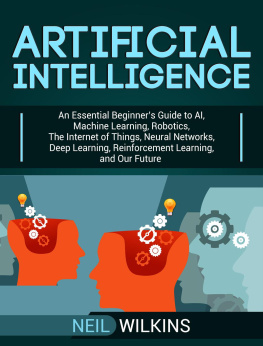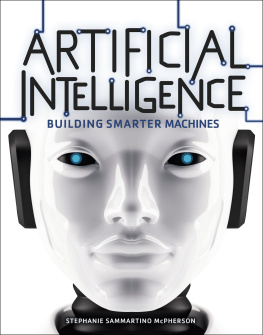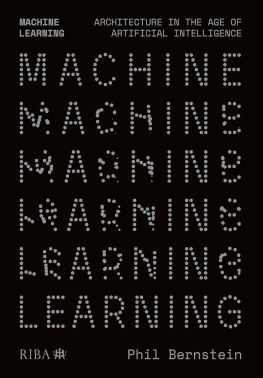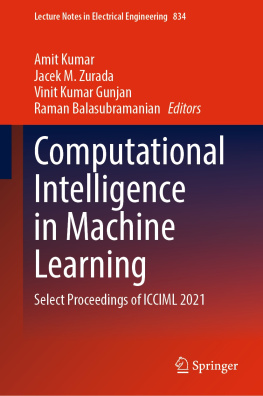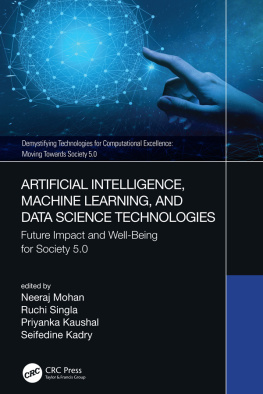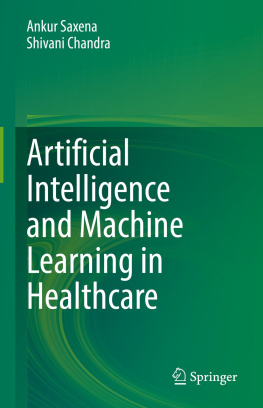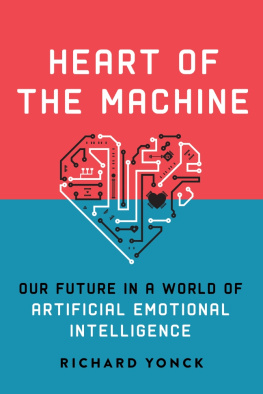Contents
Figures
Tables
Guide
Pages

Artifictional Intelligence
Against Humanitys Surrender to Computers
Harry Collins
polity
Copyright Harry Collins 2018
The right of Harry Collins to be identified as Author of this Work has been asserted in accordance with the UK Copyright, Designs and Patents Act 1988.
First published in 2018 by Polity Press
Polity Press
65 Bridge Street
Cambridge CB2 1UR, UK
Polity Press
101 Station Landing
Suite 300
Medford, MA 02155, USA
All rights reserved. Except for the quotation of short passages for the purpose of criticism and review, no part of this publication may be reproduced, stored in a retrieval system or transmitted, in any form or by any means, electronic, mechanical, photocopying, recording or otherwise, without the prior permission of the publisher.
ISBN-13: 978-1-5095-0415-2
A catalogue record for this book is available from the British Library.
Library of Congress Cataloging-in-Publication Data
Names: Collins, H. M. (Harry M.), 1943- author.
Title: Artifictional intelligence : against humanitys surrender to computers / Harry Collins.
Description: Medford, MA : Polity Press, 2018. | Includes bibliographical references and index.
Identifiers: LCCN 2017059139 (print) | LCCN 2018002923 (ebook) | ISBN 9781509504152 (Epub) | ISBN 9781509504114 (hardback) | ISBN 9781509504121 (pbk.)
Subjects: LCSH: Artificial intelligence--Philosophy. | Artificial intelligence--Social aspects. | Artificial intelligence--Moral and ethical aspects.
Classification: LCC Q334.7 (ebook) | LCC Q334.7 .C65 2018 (print) | DDC 006.301--dc23
LC record available at https://lccn.loc.gov/2017059139
The publisher has used its best endeavours to ensure that the URLs for external websites referred to in this book are correct and active at the time of going to press. However, the publisher has no responsibility for the websites and can make no guarantee that a site will remain live or that the content is or will remain appropriate.
Every effort has been made to trace all copyright holders, but if any have been inadvertently overlooked the publisher will be pleased to include any necessary credits in any subsequent reprint or edition.
For further information on Polity, visit our website:politybooks.com
Acknowledgements
I thank my wife, Susan, for inventing the main title Artifictional Intelligence and for drawing my attention to computer says no. Tammy Boyce helped with locating relevant films. I thank those who were willing to spend time on talking with me about the current state of artificial intelligence research. Steven Schockaert, who works at the frontiers of the science and engineering of AI at Cardiff University, was a generous conversational partner over a series of lunches, and also read the first draft of the manuscript and provided many valuable comments. I thank the members of the Cardiff University computing departments Deep Learning Reading Group for allowing me to sit in on and occasionally mess up their weekly meetings. Michael Bolton, Arthur Reber, Edgar Whitley and various of my colleagues in Cardiff University also read the text and offered me valuable advice. Readers from the frontiers of the AI or computing research community included three anonymous readers recruited by Polity Press and, as a result of my approaches, Ernest Davis, Hector Levesque and Alan Blackwell, who also engaged in generous discussions, mostly by email but in one case face-to-face. They each also made extensive and sometimes critical comments on the text, which have been invaluable in helping me to eliminate some mistakes and add various subtleties. Crucially, they encouraged me in respect of the question of whether my technical abilities were sufficient for the task I had set myself. All remaining lacunae, mistakes and infelicities remain entirely my responsibility. I also thank those cited in the book, such as Geoffrey Hinton and Yoshua Bengio, for invaluable discussions about the frontiers of deep learning. From Polity Press, Emma Longstaff read an early version of the draft, while Jonathan Skerrett read a penultimate draft; both provided enormously helpful feedback which resulted in significant improvements. I also thank Polity Press for encouraging me to write the book, and thank Neil de Cort for handling all aspects of its production in a speedy and stressfree way, with special thanks to Helen Gray for sympathetic and imaginative copy-editing which places her in the top 0.1 per cent of copy-editors.
The work on gravitational-wave detection reported here was supported by a series of grants over many years: 1975, SSRC 893 Further Exploration of the Sociology of Scientific Phenomena; 199596, ESRC (R000235603) 39,927 The Life After Death of Scientific Ideas: Gravity Waves and Networks; 19962001, ESRC (R000236826) 140,000 Physics in Transition; 200206, ESRC (R000239414) 177,718 Founding a New Astronomy; 200709, ESRC (RES-000-22-2384) 48,698 The Sociology of Discovery; 2010ongoing, US National Science Foundation grant PHY-0854812 to Syracuse University Toward Detection of Gravitational Waves with Enhanced LIGO and Advanced LIGO, P.I.: Peter Saulson, Open-ended, To complete the sociological history of gravitational wave detection. Work on the Imitation Game relevant to this book was supported by, 201116, European Research Council Advanced Grant (269463 IMGAME) 2,260,083 A new method for cross-cultural and cross-temporal comparison of societies. Work on the relationship between fringe and mainstream science was supported by 201416, ESRC (RES/K006401/1) 277,184 What Is Scientific Consensus for Policy? Heartlands and Hinterlands of Physics.
1
Computers in Social Life and the Danger of the Surrender
I believe that at the end of the century the use of words and general educated opinion will have altered so much that one will be able to speak of machines thinking without expecting to be contradicted.
Computer says no.
Language, intelligence and embedding in society
For nearly seventy years we humans have been arguing about whether computers will ever equal us in intelligence. The argument has become more interesting and heated with recent startling successes in machine intelligence using a technique called deep learning, where machines teach themselves by extracting knowledge from enormous databases. Though there have been important technical breakthroughs in processing speeds and clever algorithms and architecture, the enormous databases are what provide the key. Because there has been such a huge increase in the capacity and speed of computers, the technical and logistic limitations on the handling of huge amounts of data are no longer a serious barrier and are well on their way to becoming irrelevant. This means that machines are now making contact with the vast and complex domain of everyday human interaction and learning from it. The result is that they can now do what was unforeseeable only a decade or so back and fascinating problems are presented to those who are sceptical about the potential of artificial intelligence. That said, the central claims made in this book are negative:
- No computer will be fluent in a natural language, pass a severe Turing Test and have full human-like intelligence unless it is fully embedded in normal human society.

